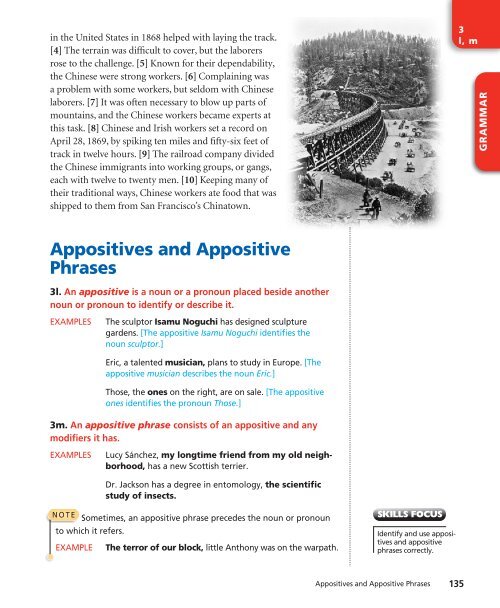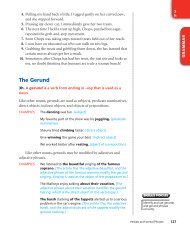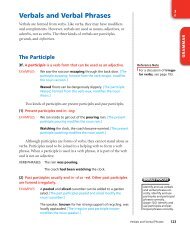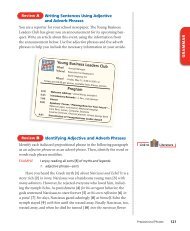Appositives and Appositive Phrases - Classes
Appositives and Appositive Phrases - Classes
Appositives and Appositive Phrases - Classes
Create successful ePaper yourself
Turn your PDF publications into a flip-book with our unique Google optimized e-Paper software.
in the United States in 1868 helped with laying the track.<br />
[4] The terrain was difficult to cover, but the laborers<br />
rose to the challenge. [5] Known for their dependability,<br />
the Chinese were strong workers. [6] Complaining was<br />
a problem with some workers, but seldom with Chinese<br />
laborers. [7] It was often necessary to blow up parts of<br />
mountains, <strong>and</strong> the Chinese workers became experts at<br />
this task. [8] Chinese <strong>and</strong> Irish workers set a record on<br />
April 28, 1869, by spiking ten miles <strong>and</strong> fifty-six feet of<br />
track in twelve.hours. [9] The railroad company divided<br />
the Chinese immigrants into working groups, or gangs,<br />
each with twelve to twenty men. [10] Keeping many of<br />
their traditional ways, Chinese workers ate food that was<br />
shipped to them from San Francisco’s Chinatown.<br />
<strong><strong>Appositive</strong>s</strong> <strong>and</strong> <strong>Appositive</strong><br />
<strong>Phrases</strong><br />
3l. An appositive is a noun or a pronoun placed beside another<br />
noun or pronoun to identify or describe it.<br />
EXAMPLES The sculptor Isamu Noguchi has designed sculpture<br />
gardens. [The appositive Isamu Noguchi identifies the<br />
noun sculptor.]<br />
Eric, a talented musician, plans to study in Europe. [The<br />
appositive musician describes the noun Eric.]<br />
Those, the ones on the right, are on sale. [The appositive<br />
ones identifies the pronoun Those.]<br />
3m. An appositive phrase consists of an appositive <strong>and</strong> any<br />
modifiers it has.<br />
EXAMPLES Lucy Sánchez, my longtime friend from my old neighborhood,<br />
has a new Scottish terrier.<br />
Dr. Jackson has a degree in entomology, the scientific<br />
study of insects.<br />
NOTE Sometimes, an appositive phrase precedes the noun or pronoun<br />
to which it refers.<br />
EXAMPLE The terror of our block, little Anthony was on the warpath.<br />
Identify <strong>and</strong> use appositives<br />
<strong>and</strong> appositive<br />
phrases correctly.<br />
<strong><strong>Appositive</strong>s</strong> <strong>and</strong> <strong>Appositive</strong> <strong>Phrases</strong> 135<br />
3<br />
l, m<br />
GRAMMAR
GRAMMAR<br />
Reference Note<br />
For more about essential<br />
<strong>and</strong> nonessential<br />
phrases, see page 322.<br />
HELP<br />
A sentence<br />
in Exercise 12<br />
may contain more<br />
than one appositive<br />
or appositive phrase.<br />
136 Chapter 3 The Phrase<br />
<strong><strong>Appositive</strong>s</strong> <strong>and</strong> appositive phrases that are not essential to the<br />
meaning of the sentence are set off by commas. If the appositive is<br />
essential to the meaning, it is generally not set off by commas.<br />
EXAMPLES My teacher, Mr. Byrd, trains parrots. [The writer has only<br />
one teacher. The appositive is not necessary to identify the<br />
teacher. Because the information is nonessential, it is set off<br />
by commas.]<br />
My teacher Mr. Byrd trains parrots. [The writer has more<br />
than one teacher. The appositive is necessary to tell which<br />
teacher is meant. Because this information is essential to<br />
the meaning of the sentence, it is not set off by commas.]<br />
NOTE<br />
Commas are generally used with appositives that refer to<br />
proper nouns.<br />
EXAMPLE Linda, the editor, assigned the story.<br />
However, a word or phrase that is commonly accepted as part of<br />
a person’s name or title is not set off by a comma.<br />
EXAMPLE The Roman Army defeated Attila the Hun in A.D. 451.<br />
Exercise 12<br />
Identifying <strong>Appositive</strong> <strong>Phrases</strong><br />
Identify the appositive phrases in the following sentences. Then,<br />
give the noun or pronoun that each appositive phrase identifies or<br />
describes.<br />
EXAMPLE 1. I usually write haiku, poems in a traditional Japanese<br />
form.<br />
1. poems in a traditional Japanese form—haiku<br />
1. Our community has a new organization, a writers’ club called<br />
Writers, Inc.<br />
2. Marquita Wiley,a college.instructor, started the group at the<br />
request of former students.<br />
3. A published author, she conducts the meetings as workshops.<br />
4. The writers meet to read their works in progress, fiction or poetry,<br />
<strong>and</strong> to discuss suggestions for improvement.<br />
5. The members, people from all walks of life, have varied interests.<br />
6. A mechanic.by trade,J.D..Ellis writes funny poems about his<br />
hobby,bird-watching.<br />
7. My friend Lusita just had a short story about her people, the Zuni,<br />
published in a national magazine.
8. Next week, we’ll meet at our regular time, 3:30.P.M.<br />
9. Our guest speaker is Pat Mora,a Mexican American poet whose<br />
work emphasizes harmony between cultures.<br />
10. Have you read her poem “Bribe”?<br />
Review H Identifying Verbal <strong>Phrases</strong> <strong>and</strong> <strong>Appositive</strong><br />
<strong>Phrases</strong><br />
Find the verbal phrases <strong>and</strong> appositive phrases in the following sentences.<br />
Identify each phrase as a participial phrase, a gerund phrase, an<br />
infinitive phrase, or an appositive phrase.<br />
EXAMPLE 1. Automobiles have been partly responsible for drastically<br />
changing life in the twentieth century.<br />
1. drastically changing life in the twentieth century—<br />
gerund phrase<br />
1. Developing the automobile was actually the creative work of many<br />
people, but Henry Ford deservedly receives much credit.<br />
2. Ford’s company, using an assembly line <strong>and</strong> interchangeable parts,<br />
first produced the Model T in 1909.<br />
3. Many people in the early 1900s wanted to buy cars because.of.their<br />
low prices <strong>and</strong> novelty.<br />
4. By giving people an alternative to mass transit,<br />
automobiles did much to change the social <strong>and</strong><br />
business scene of.the United States.<br />
5. No longer dependent on streetcars <strong>and</strong> trains,<br />
the first motorists used automobiles for going<br />
on recreational <strong>and</strong> family trips.<br />
6. Clearly overjoyed with their vehicles, many<br />
Americans regarded automobiles as necessities<br />
by the 1920s.<br />
7. One writer, a famous historian, noted that<br />
the automobile industry led to such new<br />
businesses as gas stations, repair garages, tire<br />
companies, <strong>and</strong> motels.<br />
8. To get a clear idea of.changes in automobile designs over the years,<br />
look at the picture to the right.<br />
9. The photo shows Henry Ford, looking contented <strong>and</strong> proud, in<br />
his first car.<br />
10. What are some of the main differences between Ford’s car, one of<br />
the most advanced vehicles of its day, <strong>and</strong> modern cars?<br />
HELP<br />
A sentence in<br />
Review H may<br />
contain more than one<br />
verbal or appositive phrase.<br />
<strong><strong>Appositive</strong>s</strong> <strong>and</strong> <strong>Appositive</strong> <strong>Phrases</strong> 137<br />
GRAMMAR
GRAMMAR<br />
HELP<br />
Although several<br />
possible answers are<br />
given in the example in<br />
Review I, you need to<br />
write only one sentence<br />
for each item.<br />
138 Chapter 3 The Phrase<br />
Review I<br />
Writing Appropriate <strong>Phrases</strong><br />
Rewrite each of the following sentences, supplying an appropriate<br />
prepositional, verbal, or appositive phrase to fill in the blank. Use each<br />
type of phrase at least twice. Identify each phrase you use as prepositional,<br />
participial, infinitive, gerund, or appositive.<br />
EXAMPLE 1. We have room for only a single passenger .<br />
1. We have room for only a single passenger weighing less<br />
than one-hundred fifty pounds. — participial<br />
or<br />
We have room for only a single passenger in the boat.<br />
— prepositional<br />
or<br />
We have room for only a single passenger, a small one!<br />
— appositive<br />
or<br />
We have room for only a single passenger to come<br />
aboard. — infinitive<br />
1. Only one was left on the plate.<br />
2. Joyfully, she danced .<br />
3. Richard, , is moving back to the town!<br />
4. During the whole trip to Mexico, her goal was .<br />
5. , the new computer still sat in boxes on the floor.<br />
6. At the bottom of the river, a huge old catfish lay .<br />
7. made them strong enough for the race.<br />
8. Navajo dancers stepped lightly into the open circle.<br />
9. became their goal for the rest of the year.<br />
10. All the clothes had been made in the United States.<br />
11. The lace curtains were not for sale.<br />
12. Are these puppies all yours?<br />
13. What a marvelous aroma is rising !<br />
14. , the engine finally started.<br />
15. With a glance at the other runners , Gretchen pulled ahead.<br />
16. Bill Briggs, , greeted the enthusiastic fans.<br />
17. Everyone should move down one seat.<br />
18. was the thought of each student in the class.<br />
19. The children made mud pies.<br />
20. gave them the endurance they needed.





